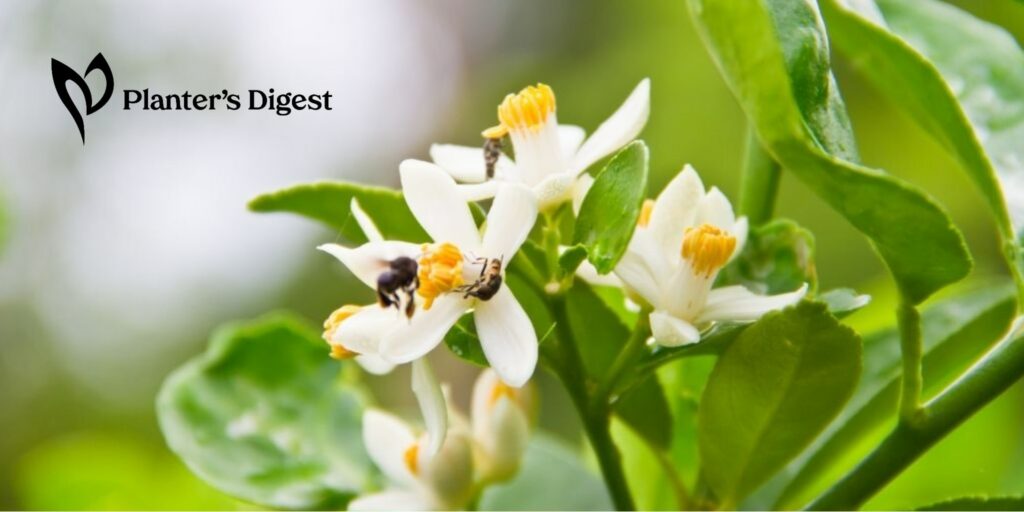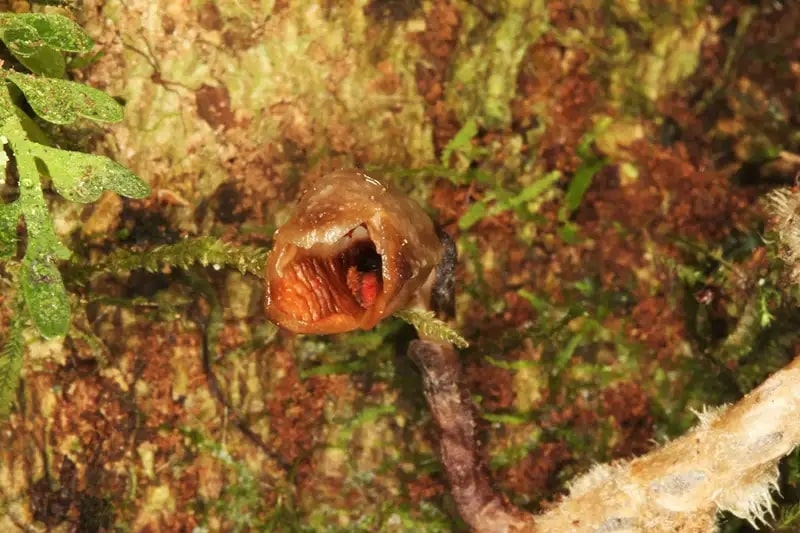There’s nothing more beautiful to a gardener than the sight of flowers heralding the coming fruits, and the lemon is no exception. But when does this happen and what causes it to happen?
Let’s take a quick look at each!
Factors Influencing Flowering Lemon Trees
Lemon trees typically bloom in the spring, but the timing can vary on factors such as seasonal timing, climate, tree maturity, tree variety, environment, and pollination.
Seasonal Timing
Lemon trees tend to flower between March and May but, of course, this can vary as well. This flowering period is caused by the increasing daytime hours and the warming temperatures of spring.
Climate Variations
If you live in warmer climates, your lemon trees will usually start blooming earlier. Sometimes you can see the blossoms even in late winter!
On the other hand, when grown in colder climates, your lemon trees tend to bloom a bit later in the spring. Some will even start to flower going to summer.
Tree Maturity
Young lemon trees below 3 years old usually don’t produce blossoms. On the other hand, mature trees over 3 years old tend to bloom regularly over time, provided there are no other tree health-related issues.
Cultivar and Variety
Some lemon varieties are known for their early. Others are noted for their late blooms, so check the specific variety that you have or plan to have.
Environmental Factors
Factors like temperature, humidity, and soil quality affect the flowering of lemon trees. A mature lemon tree grown in optimal conditions will most often flower during springtime.
Pollination
Bees and other pollinators are important garden visitors, especially if you’re looking forward to some summertime lemonade. If you notice a lack of lemon flowers, it could be related to low numbers or a lack of pollinators.
How often does a lemon tree bloom?
Lemon trees are beloved not just for their fruits but also for the delicate beauty of their fragrant flowers. Some lemon trees can bloom seasonally while others bloom throughout the year.
Annual Blooms
Some lemon trees have an annual blooming cycle. This primary bloom usually occurs in spring.
Most of the time, it happens between March and May, depending on your local climate. During this annual bloom, lemon trees produce many white or pale pink flowers, making it the most impressive display of blossoms in a year.
The fruits from this primary spring bloom become the primary lemon crop for the year. You’ll find it ripening and usually ready for harvest in the months following the bloom.
Multiple Blooms
Some lemon trees can bloom and bear fruit all year round and not just during spring. Plus, the frequency of these extra blooms can vary so sometimes you just might be surprised when your lemon tree suddenly decides to burst into blooms.
Some lemon trees may have sporadic blooms throughout the year, while others might flower more consistently. Lemon trees in warmer climates tend to have more continuous blooms.
This is due to milder weather that’s more conducive to the reproductive process of flowering and fruiting. Different lemon tree varieties have varying tendencies for multiple blooming.
Some varieties tend to produce more off-season blossoms than others. If you have a lemon tree like this, enjoy the show while it lasts!
What are the possible reasons that prevent my lemon tree from flowering?
While we’ve discussed the factors that can cause your lemon trees to bloom, there are also reasons that prevent them from producing those delicately fragranced flowers.
The possible reasons that prevent lemon trees from flowering include age, environment, sunlight, pruning, nutrients, watering, pests and diseases, pollination, genetics, and stress.
Age and Immaturity
Young lemon trees take a few years to establish and start flowering regularly. Expect around 3 to 4 years for lemon trees to produce white blossoms.
Lemon trees can bloom throughout the year with the right conditions. But, if your tree is still young, just be patient and wait for it to mature before expecting it to flower.
Environmental Stress
Factors like extreme temperatures, sudden temperature changes, or cold drafts can stop flowers from forming.
There’s a simple solution: plant your lemon tree where temperatures are steady and use coverings to protect it from extreme or changing weather conditions.
Insufficient Sunlight
Lemon trees need plenty of sunlight for healthy flowers and fruit. Low sunlight exposure results in weaker trees with fewer flowers and little to no fruit.
Counteract this by making sure your lemon tree gets 6 to 8 hours of direct sunlight daily. More sunlight means better growth of leaves, flowers, and fruit.
Improper Pruning
Avoid excessive pruning or incorrect techniques when trimming your tree. If you don’t, you’ll be removing branches that would normally produce flowers and fruits.
Instead of just hacking away at everything, focus on removing the sickly, dead, damaged, and unnecessary parts of your lemon tree.
Nutrient Deficiencies
Nutrient deficiencies are known to prevent lemon trees from flowering. Make them healthier by feeding them with nitrogen, phosphorus, and potassium (NPK) in the form of fertilizers.
Fertilize your trees regularly with a balanced NPK mix, like a 5-5-5 or a 10-10-10. You can also use organic compost or well-rotted dried manure for a slower nutrient release.
Watering Issues
Overwatering and underwatering stresses lemon trees out easily and will affect their ability to bloom. You can avoid this from happening by maintaining a consistent watering schedule.
Make sure that the soil’s consistently moist. Avoid making it too wet or letting it dry out completely to avoid drowning or dehydrating the roots of the lemon tree.
Pests and Diseases
Pests and diseases can wreak havoc on your lemon tree and cause it to be sickly. To keep your lemon tree healthy and productive, check it regularly. For what?
Keep an eye out for pests like aphids or scale insects, as well as diseases like citrus canker. If you find any of these issues, control and treat them as soon as you can.
Inadequate Pollination
Lemon trees depend on pollinators like bees for fruit development. If there aren’t enough pollinators in the area, blooming and fruit production will be affected.
If this is your situation, don’t worry. Plant companion plants with nectar-rich flowers nearby to attract these beneficial insects.
Variety and Genetics
Some lemon tree varieties naturally bloom less frequently than others. If you have a variety known for irregular blooming, it may just be part of its natural growth pattern.
Stress Factors
Various forms of stress, like transplant shock, sudden environmental changes, or root damage, can cause lemon trees to temporarily stop blooming. This is because the trees are redirecting their energy towards survival instead of reproduction.
Causes of Lemon Flowers Falling Off
Lemon flowers falling off are generally termed “blossom drop”, and the term is just perfect. Blossom drop in lemon trees, as with other flowering trees, is often caused by several factors.
These include issues related to the environment, pollination, nutrients, watering, diseases, chemical damage, genetics, and other forms of stress. Let’s take a quick glance at each.
Environmental Stress
Lemon trees are pretty sensitive to sudden temperature changes, strong winds, or extreme heat. To prevent this from happening, plant your lemon tree in a protected area.
Pollination Issues
If there are no pollinators like bees, lemon tree flowers will drop before they get pollinated. Bad weather conditions, such as rainy or windy days, will also prevent bees and other pollinators from doing their job.
Nutrient Imbalance
Nutrient imbalance, especially potassium deficiency, is another cause of blossom drop. Check that your lemon tree gets enough balanced fertilization to prevent poor flower and fruit development.
Water Stress
Water properly and you won’t stress out your lemon tree from too much or too little water. Just keep the soil consistently moist but not overly saturated and it’ll be fine.
Fungal Diseases
Fungal diseases can also affect lemon tree flowers. Blossom-end rot or citrus canker are known to cause them to drop prematurely.
Inspect your lemon tree regularly for signs of disease and take the proper control measures.
Pesticide or Chemical Damage
Be very careful when using pesticides or chemical sprays, especially during the flowering period to prevent flower drop and damage. Always follow the recommended guidelines stated on the product.
Protect yourself as well by wearing safety equipment and clothing. An ounce of prevention, after all, is better than a pound of cure.
Lack of Thinning
Thinning is the technique where excess flowers are manually removed. This is because lemon trees often produce more flowers than they can support with fruit.
This makes the tree more focused on fewer fruits instead of dividing its energy among smaller but multiple fruits. Without thinning, the tree may naturally shed some of them to allocate resources to the remaining flowers.
Thinning the flowers also makes sure that the resulting fruits don’t compete for nutrients and resources. When lemon flowers are thinned out, you tend to get larger, healthier, and more abundant fruit harvests.
Variety and Genetics
Certain lemon tree varieties are more prone to flower drop due to their genetics. If you’re dealing with a variety known for this tendency, it may be a natural part of its growth pattern.
If you suspect this to be the cause, double-check your lemon variety.
Stress Factors
Any form of stress, such as transplant shock, root damage, or changes in environmental conditions, can cause flowers to drop. In such cases, the tree redirects its energy towards survival rather than fruit production.





